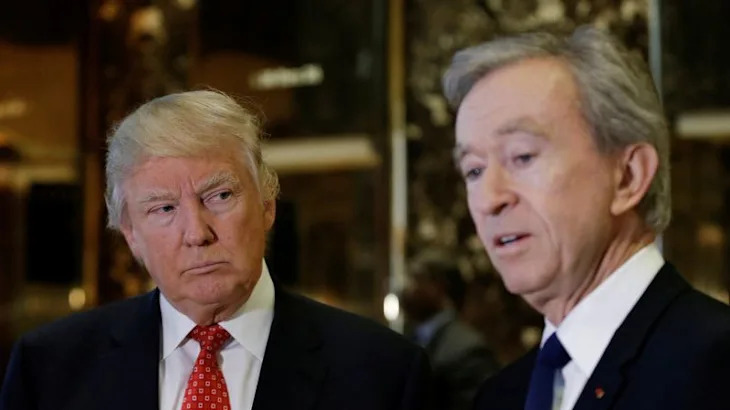Global market rout darkens outlook for European luxury labels
By Mimosa Spencer
PARIS (Reuters) - Growing fears that Donald Trump's tariff blitz will plunge the world into recession are dashing hopes in the $400-billion-a-year luxury industry that wealthy Americans might help to pull it out of the biggest slump in years.
One Wall Street analyst now expects worldwide sales of luxury goods will fall by as much as 2% this year, down from a previous forecast for 5% growth. If confirmed, that would mark the industry's longest downturn in over two decades.
Bernstein analyst Luca Solca cited the fallout from Trump's April 2 announcement of import taxes on major U.S. trading partners as reasons for the downgrade.
"Uncertainty, and the likely continuing rout in stock markets, are creating a self-fulfilling prophecy: a global recession," he wrote in a note to clients.
Trump's tariffs were more sweeping than many market players feared, and have prompted retaliation from China, igniting a trade war that has left stock markets reeling.
Shares in sector leader LVMH are now down 2% since the start of the year, while Gucci owner Kering is down 31%. Hermes and Cartier owner Richemont, seen as better placed than many to weather a downturn thanks to their wealthier clientele, are down 8% and 6% respectively.
"The tariff turmoil has increased worries," said Mario Ortelli, managing partner at luxury advisory firm Ortelli & Co.
"This is not helping the sentiment of the luxury consumer."
All eyes will be on LVMH when it kicks off first-quarter financial reports on April 15.
European fashion and jewellery houses like LVMH's Louis Vuitton, Chanel and Richemont label Cartier had been counting on sales growth from wealthy Americans to help offset weak demand in China.
"Everything appeared so perfectly aligned," at the start of 2025, said HSBC analyst Erwan Rambourg, as stock markets, the dollar, cryptocurrencies, and U.S. consumer confidence all rose.
But signs of weakness emerged even before Trump's tariff bombshell. Citi data released Tuesday showed U.S. credit card spending on luxury brands fell 5% in March and February, year-on-year, after growing the previous two months.
Vontobel analysts warned at the start of April about growing "luxury fatigue" and deteriorating U.S. consumer sentiment.
Then came the market tumult unleashed by Trump's tariffs, potentially a key influence on U.S. spending given so much of the country's wealth is linked to equities.
TRICKY PRICING
Groups like LVMH, Kering and Richemont are expected to draw on their brands' pricing power to shield profits from tariffs, but investors are worried that shoppers who can afford $10,000 leather handbags and gold bracelets could tighten their purse strings against a darkening economic backdrop.
In such conditions, pricing - already a delicate balancing act after record hikes in the pandemic - will be key as shoppers become "more mindful, scrutinising their spend," said Ortelli.
U.S. import tariffs of 20% on goods from the European Union and 31% from Switzerland are expected to prompt European luxury brands to raise U.S. prices by around 6% on average to protect profits, according to estimates from UBS.
Labels including Gucci, Chanel and Cartier already raised prices on some products in March by between 5% and 6%, according to Citi, which sees further high single-digit percentage increases in the coming weeks.
If companies don't hike prices, Barclays forecasts a negative impact on earnings before interest and tax of 1.5% at LVMH's key fashion and leather goods division, and 2.4% at Prada and Hermes. Kering could take a 8.7% hit, due to lower pricing power at Gucci as it undergoes a revamp, while Swiss-based watchmaker Richemont could see a 7.1% decline, it estimated.
The U.S. is the Swiss watch industry's largest market, worth over twice as much in terms of exports as China last year, according to the Federation of the Swiss Watch Industry.
Europe's luxury sector was largely spared tariffs during Trump's first term from 2017 to 2021, despite increased trade tensions.
This time, luxury executives are hoping that LVMH chairman and CEO Bernard Arnault, who attended Trump's inauguration, will be able to leverage his links with the U.S. president to negotiate exemptions for the sector.
Arnault, who like Trump launched his career in New York City's real estate scene in the 1980s, in January contrasted a "wind of optimism" in the U.S. with the "cold shower" of taxes in France. LVMH did not respond to a request for comment on Arnault's current view of the U.S. market.
SLOWER START
Sales reports for the three months to the end of March are expected to show luxury sector growth slowing to 0.5% from around 3% at the end of last year, according to HSBC estimates that were drawn up before the recent stock market dives.
LVMH's fashion and leather goods division is forecast to report flat sales, according to Visible Alpha consensus figures.
Moncler, which reports on April 16, is forecast to post a 1.3% rise in sales, while Hermes, on April 17, is expected to deliver an almost 10% increase.
Sales at Kering, which reports on April 23, are seen falling nearly 10%, weighed down by Gucci as the group seeks to engineer its turnaround.
But it won't be easy to draw conclusions from the numbers.
"Recent days have thrown up a myriad of incremental unknowns," Jefferies analysts said on Tuesday, waiting for "a modicum of stability" before adjusting forecasts for the sector.
($1 = 0.9162 euros)
(Reporting by Mimosa Spencer in Paris. Additional reporting by Elisa Anzolin in Milan and Tassilo Hummel in Paris. Editing by Mark Potter)
